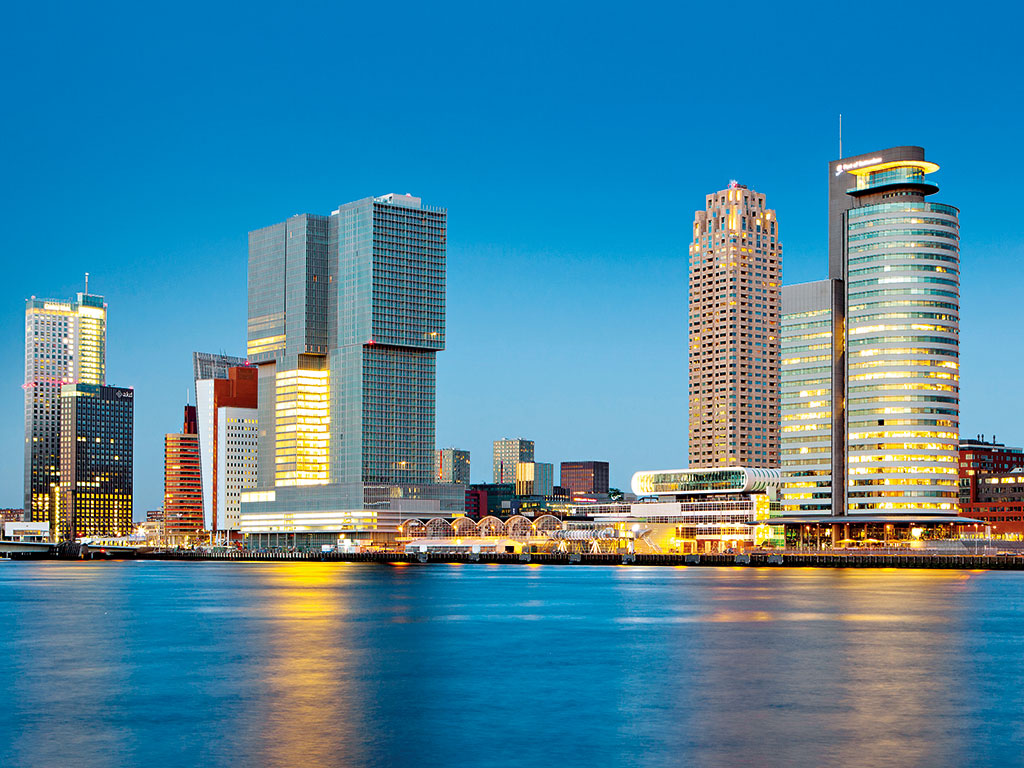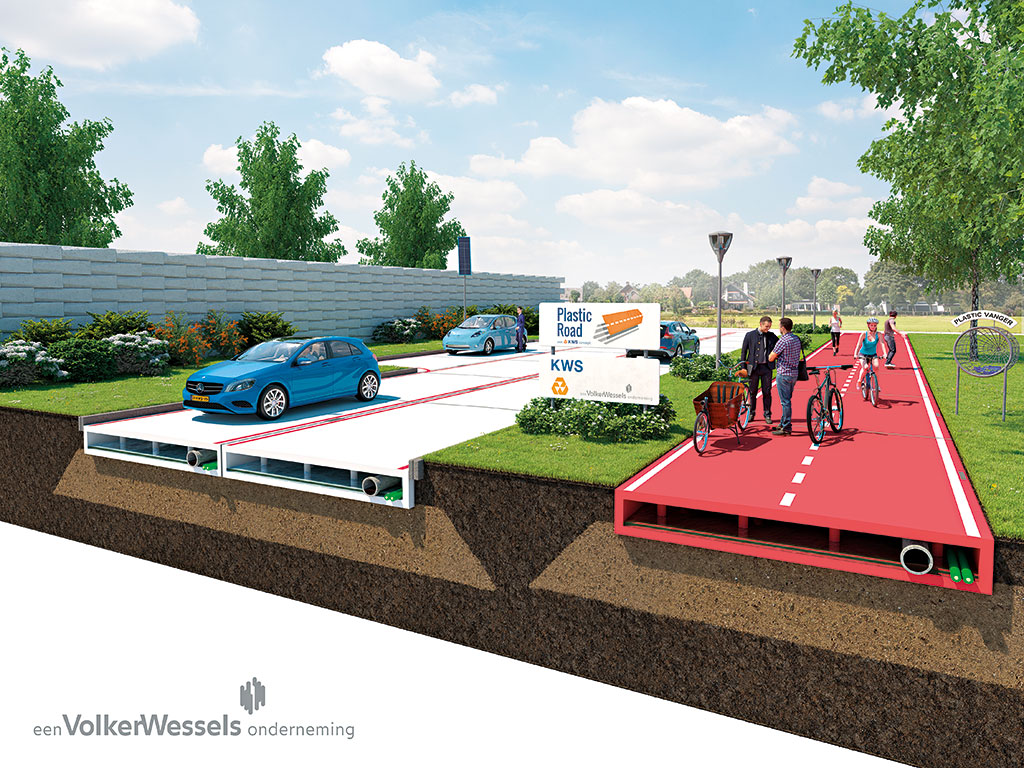Rotterdam’s future shines bright
As urban populations swell and resources are excessively expended, it is crucial for cities to get smart. While others struggle to contend with this 21st-century challenge, Rotterdam leads by example

The skyline of Rotterdam, a world-leading city in sustainability and smart initiatives
For the first time in history, more people live in urban than in rural areas, so it is more important than ever before for cities to become sustainable. This involves creating green areas, promoting efficiency and reducing waste – with innovation acting as the key for all these feats. Leading the way in achieving smart practices and improving the public space for all stakeholders is the Dutch city of Rotterdam.
For years, Rotterdam has embraced innovation and experimental programmes in order to develop into one of the world’s most sustainable cities. At the centre of its strategy lies a need for constant improvement, development and renewal. With this focus, it has achieved a worldwide reputation for its smart ambitions. By providing opportunities to those with proposed solutions – from small companies to large, and any individuals who might have an idea – Rotterdam is able to explore new concepts through an open-minded approach. And as a testament to its prominence in the sphere of modern metropolises, Rotterdam is preparing a bid to host the World Expo 2025, an event that tackles the world’s problems on an international stage.
A local government cannot dictate a smart city programme, it can only be realised
with partners
The New Economy had the opportunity to speak with Johan Vermeer, Managing Director of Project Management and Engineering for the City of Rotterdam, about what it takes to be a smart city and how Rotterdam is leading the way.
How would you define a smart city?
A smart city uses innovation to improve itself. Innovation can be related to new technology, but it can also mean working together in new ways and new levels of social inclusion. A smart city is not driven by civil servants or politicians, but by everyone who uses the city: inhabitants, institutions, businesses and the local government.
How has Rotterdam evolved and how has it come to be seen as a smart city?
Rotterdam has been working on smart city initiatives for more than seven years now, with the first steps focused on ways to improve the city’s climate. After a couple of years, innovation in other sectors also arose, such as domotics in healthcare, ICT tools for city security officers, open data programmes with students, improving fibre infrastructure in the city, and public Wi-Fi. People called it ICT innovation, but that is not the right word; instead it is innovation that derives from how you use all new technologies, in all aspects. Our continued efforts have resulted in Smart City Planner, Smart City Lightning, 3D modelling, city rain radar, open data platforms and sensor based garbage collection. We have also improved water management through methods such as underground water storage facilities.
What makes Rotterdam an ideal testing ground for the development of smart city applications?
Rotterdam was rebuilt after it was heavily bombed during World War Two. That’s one of the reasons Rotterdam is so accustomed to continuous development, as well as making bold and innovative choices – it has become part of the city’s DNA. People working and living in Rotterdam have an open mind-set, they embrace new ideas easily and, above all, there is a real ‘can do’ mentality. That’s why the municipality practices the lab philosophy in the city: they try to support smart city initiatives as much as possible by providing pilot areas and by connecting innovators with incubators, coaches and financers.
Furthermore, Rotterdam has many small companies in various sectors that are extremely innovative. For example, the city’s serious gaming industry is one of the best in the world. In addition, the city offers world-class education, which is provided by Erasmus University and the Delft University of Technology. For these reasons, as well as many others, earlier this year Cambridge Innovation Center chose Rotterdam as their first location outside the United States.
In what ways is Rotterdam investing in a more sustainable future, and for what reasons?
We strongly believe that economic standards in Rotterdam are changing. New business models are making an impact very quickly and Rotterdam has to change accordingly. This is easier said than done, which is why Rotterdam has started a programme called ‘The Next Economy’. The objective of this programme is to become one of the world’s top leading metropolitan areas. That entails being fully equipped to handle future changes, challenges and opportunities. Smart programmes, including Smart Industry, Smart Port, Smart City, Smart Government and our involvement with the 100 Resilient Cities campaign and the Rockefeller Foundation, all contribute to this overall objective.
Rotterdam is also one of the C40 cities, a global network of 40 megacities committed to addressing climate change. Acting both locally and collaboratively, C40 cities are making a meaningful global impact in reducing both greenhouse gas emissions and climate risks.
What are the biggest opportunities and challenges associated with the fulfilment of this vision?
The biggest challenge is to create a healthy, long-term coalition consisting of citizens, businesses, educational institutes and the local government. Investments are needed upfront and without the guarantee of profit. It is also important to learn from mistakes and keep focused on the long-term objectives. The biggest opportunities are the development of new ways of working together where all involved parties can benefit; this is how a smart – or rather, a clever – city should evolve.

Can you tell us about the Street Lab initiative and what it entails?
In the midst of our innovation district, the municipal engineering bureau has developed a Street Lab in which companies, such as VolkerWessels, are able to test their ideas. VolkerWessels had an idea to develop a road made out of recycled plastic bottles, which recently gained worldwide media attention. The local government acts as a facilitator, the companies actually develop the products and research, and knowledge institutes are asked to monitor and analyse.
Our goal is to create a green city, improve the air and public space quality, as well as reduce costs and energy consumption. The test area is open to the public, so there is normal traffic, just like in any other street. If new pavements or street furniture turn out to be a success, they are used on a larger scale in Rotterdam.
What’s next for the Street Lab initiative?
Street Lab is challenging companies to develop an energy neutral public space. We’re particularly interested in retaining rainwater, as well as generating energy in the test area. Energy Floors, a Rotterdam based company, and the Spanish company OTEM2000 are working on a unique system to achieve this. The main idea is to use solar and kinetic generated energy, and transport it to objects in the public space that require electricity, such as lampposts. Following this, we will continue making the public space more green and researching the effects of cities on society and nature.
What lessons should other cities in Europe take from Rotterdam’s evolution?
These things take time; you have to be patient and persistent. We started off by developing a vision of our future. Early in that process we involved our partners and stakeholders, making it a shared vision. From there on, we’ve held fast to that vision and translated it into guidelines, framework and programmes; both for ourselves and also to challenge and stimulate companies to come up with new ideas and concepts. Innovation often starts from small companies or individuals – that fact should be celebrated in order to facilitate growth and an environment that supports knowledge exchange and collaboration, particularly as a local government cannot dictate a smart city programme and it can only be realised together with partners. It is crucial to comply with open standards; only then do connections between applications, products and solutions become possible. Next to developing and inventing, it’s very important to apply. We have the habit of putting insightful ideas and strong concepts to the test. In Rotterdam, quality never ends up in a drawer.
What are your hopes and ambitions for the future of Rotterdam?
Rotterdam has been a hard working and open-minded city for decades, if not centuries, always reinventing itself and constantly developing. We will continue to do so, not only in the practical sense, but we will ensure that innovation is given the space and attention it needs. By doing so, the city will become a resilient, clever city. Rotterdam is a city with a bright, smart future, which we hope to demonstrate at the World Expo 2025.













